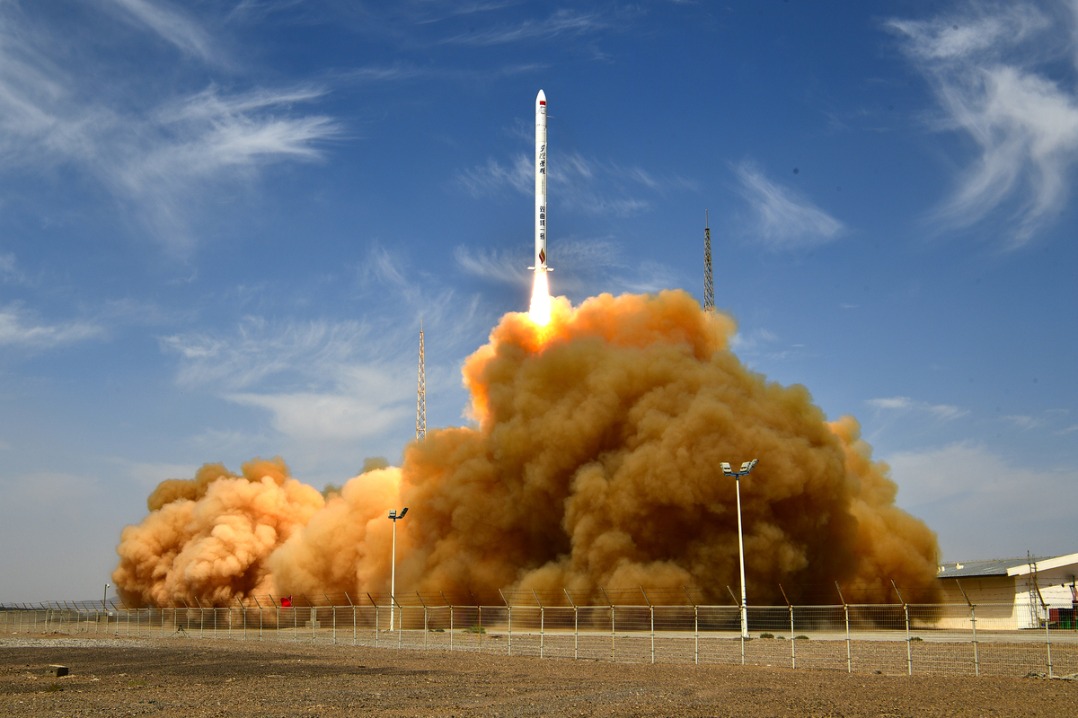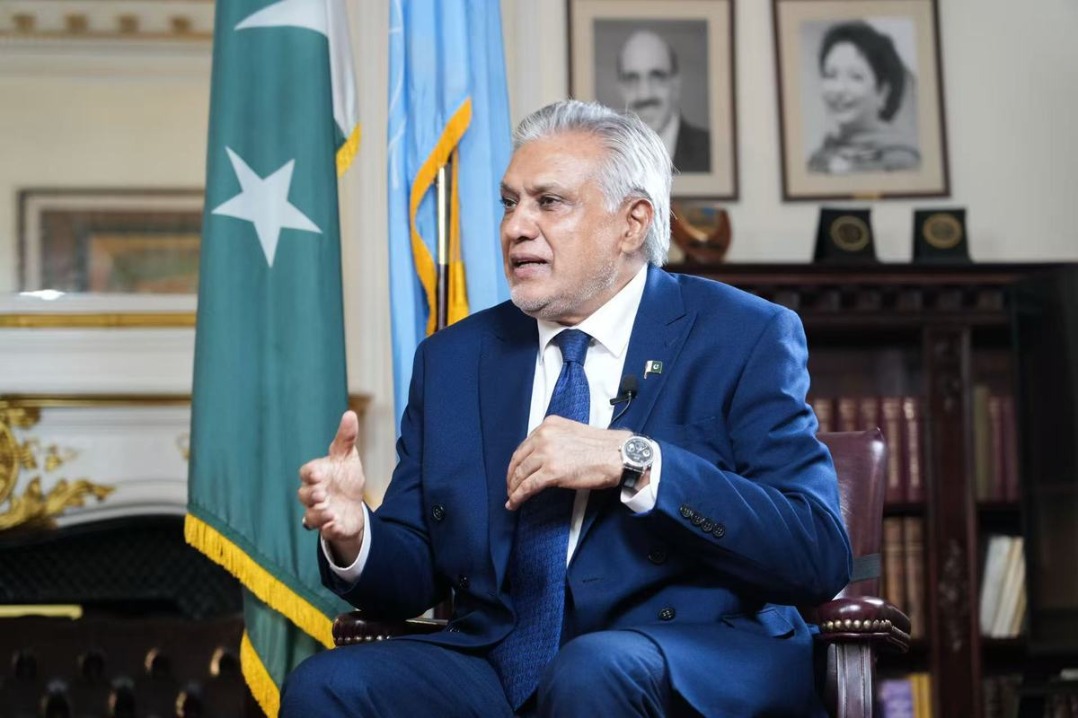Taiwan natives provide help during the pandemic
Three people from the island recall the roles they played in the Chinese mainland as the nation battled to beat the outbreak. Zhang Yi reports.

The outbreak of COVID-19 in the Chinese mainland earlier this year touched the hearts of people on both sides of the Taiwan Straits.
In their own way, many people in Taiwan were involved in the prevention and control work, helping to deal with the difficulties alongside mainland residents.
To learn more, China Daily spoke with three people from Taiwan about their experiences during the outbreak.
Hsueh Ying-tung, 46, from Tainan, Taiwan, movie director in Wuhan, Hubei province
When I attended a cross-Straits activity in Wuhan in 2017, I decided that the city would be a suitable place to pursue my career as a video director because it had a potentially large cultural market that was ripe for development.
The following year, I moved to Wuhan to try my luck and I met my business partner, a local resident.
Last year, we registered a company in the city to make promotional videos and microfilms for clients. I am in charge of innovation and production, while my partner does the marketing work.
The sudden outbreak of the novel coronavirus meant we had to cancel plans to shoot our first feature film-a love story set in the 1980s-in March, after a whole year of preparation.
There was a lot of pressure. For example, some sponsors wanted to pull out, but even during the most difficult time, we insisted on continuing the project and waiting for the outbreak to end.
After Wuhan was locked down (on Jan 23), local authorities arranged for Taiwan residents in Hubei to leave via designated flights.
I chose to stay in the place I had started my own business because I had confidence in the mainland's ability to combat the outbreak.
I stayed home, in line with the government's instructions, but I frequently contacted my family in Taiwan via the internet to keep them informed about my situation.
People in Wuhan stayed home for 76 days. The isolation made me realize how precious freedom is. It was extremely hard to stay home for so long without knowing when the lockdown would be lifted and while hearing about deaths in the news.
I thought people in quarantine should not only protect themselves from the virus, but also from negative emotions. Those feelings are also contagious and a different kind of "virus".
Instead, we had to do something positive to distract ourselves, such as writing songs, reading books or watching movies.
I enjoy playing ukulele and singing, so I wrote four songs to record my thoughts and moods during the period of isolation.
I made videos of myself playing and singing, and shared them with other people. My songs were not very professional or complex, but they were catchy and had simple lyrics, so my viewers liked them.
In the first song, I called on people not to spread rumors, but to stay home and stick together.
The second one praised the brave people who came to Wuhan from different places to fight the disease, including medical workers, bus drivers and many strangers who provided assistance.
The third piece was written after the death of Li Wenliang, the eye doctor in Wuhan, to express my respect for him.
I wrote the fourth song ahead of the lockdown being lifted.
At the time, I saw on the TV that the number of new confirmed cases was falling every day, and everyone was very excited to witness success in the battle.
From time to time, people shouted "Come on, Wuhan!" from their windows. They did it instinctively, and I was greatly inspired and moved. It was a really complicated feeling.
In the lyrics of the fourth song, I wrote:
Although the Yangtze River has its ebb and flow/
And the cherry blossoms may fade/
Spring will finally come here.
I was lucky to stay in Wuhan to experience the whole process like other locals.
After the city had recovered, we started shooting our movie in June.
We still encountered a lot of problems, though. For example, the rainy season in the province brought difficulties. Also, one of the main elements in the movie is the rhododendron, but we missed its flowering season.
Nevertheless, we finished the shoot and are now in postproduction. The film's premiere has been postponed until next year.
The actors and production team all come from Wuhan. Having been shot in the city after the outbreak, the movie is very meaningful.
Guo Yi-fan, 30, from Taichung, Taiwan, coffee shop owner in Fuzhou, Fujian province
In February, I provided more than 1,100 free cups of coffee to medical workers at hospitals in Fuzhou.
It was my way of thanking them for their devotion in the fight against the COVID-19 pandemic.
I love coffee culture. After years of learning about it, I founded my own coffee shop in Taichung, the city where I was born and raised, in 2014.
In 2016, I visited Fuzhou and came across a city that is very similar to Taichung in both culture and climate. Moreover, the coffee industry was set to boom with a huge potential market, which helped me envisage many new opportunities.
The following year I returned to Fuzhou and started my own business.
I began a workshop that offered coffee-making classes in a local startup center and took advantage of preferential policies designed to help Taiwan people who are living on the mainland.
The workshop helped me make many friends, and I gradually acquainted myself with the city. In September last year, I opened my coffee shop-it's about 60 square meters-with two mainland partners in the downtown.
To prepare for the expected consumer boom during the Spring Festival holiday, I returned to Taiwan before the holiday to reunite with my family.
I came back to Fuzhou on the second day of the new Chinese year, but the novel coronavirus outbreak pressed the "pause" button for the city and also for my coffee shop.
Although people felt scared, I saw news reports that medical workers had volunteered to help patients in Hubei, which had been hit hard. Moreover, traffic police, sanitation experts, community workers and volunteers all remained at their posts.
There are three hospitals near my shop and many of my regulars are medical professionals. They were under pressure, so I wanted to treat them to coffee to cheer them up.
I contacted the hospitals and explained my plan. I made coffee according to the required number of cups and flavors, and sent them to the specified locations. The first batch was sent out on Feb 3 and we delivered more than 1,000 cups in about a month.
I received many thank-you messages. Some said it was a very heartwarming gesture and the doctors and nurses had drunk the coffee as soon as they got off work. Some wrote things like, "The disease will go away and Fuzhou will get better."
Those messages gave me courage. Many warm-hearted citizens sent fruit and other gifts to the hospitals. They just left the items without giving their names. We locals did what we could to show respect to those who battled the disease and protected us.
My business has now recovered to about 60 percent of normal operations. I will open another coffee shop by the end of the year, so the premises are being renovated now.
I have also become a member of a local entrepreneurship and employment service center for Taiwan residents, which aims to help boost the careers of young people from the island who come to Fuzhou.
Chen Wen-cheng, 31, from Changhua, Taiwan, community volunteer for epidemic prevention and control in Beijing
The sudden outbreak of COVID-19 on the mainland gave me a new responsibility and experience-working as an epidemic-control volunteer in my community.
I am a postdoctoral researcher at Peking University. I came to the mainland in 2011 to study for a master's and then a doctorate in physical education. I met my wife in Beijing. She's a primary school teacher from Henan province.
My wife's pregnancy made it difficult to travel, so this year was the first time I hadn't returned to my hometown in Taiwan for the Spring Festival holiday.
After the outbreak in Wuhan, communities across the country began to take precautions. I live in a residential area in Haidian district where there were no confirmed cases, but strict management measures were still implemented.
When I learned that my community needed volunteers for epidemic prevention, I wanted to join them as I had the time and am in good health. My wife supported me and said it would be good to do what I could so long as I wore protective equipment.
On Feb 4, I went to the community center to sign up as a volunteer. The director was surprised to learn that I came from Taiwan, but appreciated my commitment very much. He put a volunteer's armband on my arm. At that moment, I felt a great sense of responsibility.
My job was to stand at the gates of my residential area to check the entry permits and temperatures of people who entered and remind them to wear masks. I felt like a guard when I was on duty.
I was often on duty from 8 pm to 10 pm. One night it was snowing heavily while I was on duty. It was so cold standing outside that I had to rub my hands together and stamp my feet to keep warm.
I usually worked with a 70-year-old resident, and it was admirable that he was on the front line of epidemic prevention at his age. The work was simple and repetitive, but also very important.
Some residents have to enter self-quarantine at home when they return to Beijing from certain locations. We have to carry daily necessities to their homes and take delivery of parcels for them.
The residents have been very understanding and appreciate our efforts. I have lived in the neighborhood for about five years, but I had seldom interacted with my neighbors. The volunteer work helped me become acquainted with them.
When people hear my Taiwan accent, they look at me differently and with curiosity. They ask about my hometown, local customs and travel in Taiwan, as well as people's daily lives there.
My neighbors thought it was tough for a young man from Taiwan whose wife was pregnant to be a volunteer at that difficult time. Their praise made me happy.
Since our baby was born in June, I have spent less time as a volunteer. When I finish my research later this year, I will become a university teacher in Beijing.
In the future, I will devote myself to more cross-Straits activities, and I hope my efforts will help people from both sides of the water get to know each other better.




Today's Top News
- Xi sends message to World Youth Conference for Peace
- Thai army claims Cambodia violates ceasefire agreement
- Nation's AI industry hailed as economic growth driver
- China launches national child subsidy program
- Xi urges all-out flood relief efforts
- UK asylum hotel protests spread to multiple cities






























